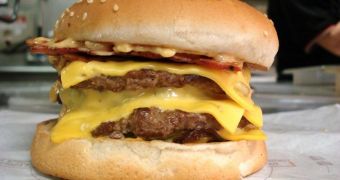A study conducted on unsuspecting lab mice revealed that feeding the rodents with a fat-rich diet leads to the formation of new neurons in an area of the brain responsible for regulating eating. The animals gained less weight if the neural growth was stopped, even while they continued to eat junk food.
The discovery will have some important implications if it holds true in humans as well. Researchers may be able to use this research to develop a way of inhibiting the growth of nerve cells in this area of the brain, therefore curbing obesity even if people don't stop eating junk food.
During the experiments, scientists noticed that mice in which they had inhibited the new neural growth remained more active throughout the study, even if they were continuously fed the fat-rich diets.
Researchers from the Johns Hopkins University (JHU) explain that additional neurons start developing in a region of the brain called the median eminence, which is located outside of the blood-brain barrier.
The BBB is the brain's most important line of defense against invading pathogens, since it acts like a very effective filter. It protects the organ from infections, and sometimes even stops drugs from taking effect where they need to.
“We really don’t understand the function of these neurons in the normal brain. Our data suggests that these neurons may have an important role in regulating feeding,” explains JHU School of Medicine associate professor and study researcher, Seth Blackshaw, in an interview for LiveScience.
He adds that the median eminence also extends deep into the brain, all the way into the hypothalamus. The latter is responsible for controlling hunger, thirst and behavior, and sends out a large number of chemical signals throughout the human body, telling it how to spend energy reserves.
While scientists have yet to figure out how the median eminence works as a whole, they do suspect that its location outside the BBB allows it to detect chemical levels in the bloodstream, and inform the hypothalamus so that the latter can make decisions about eating.
When mice in the study were put on a diet containing 60 percent fat (a significant increase from the 35 percent in usual mouse food), their median eminences ramped up new cell production, from 1 percent to 5 percent.
Details of the new study were published in the March 25 issue of the journal Nature Neuroscience.
“We have no idea if this happens in any species other than mice. In humans all the cells and the structures are conserved. I think there's no reason to assume necessarily that this wouldn’t happen in humans, but I would be very careful into reading too much in these studies,” Blackshaw concludes.

 14 DAY TRIAL //
14 DAY TRIAL //